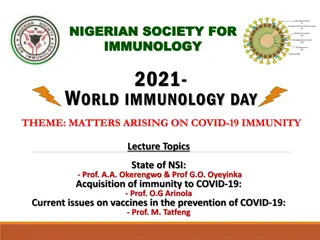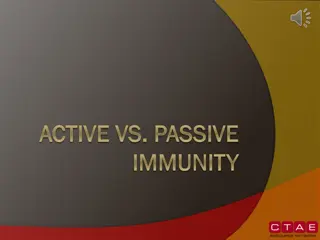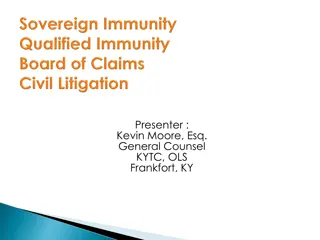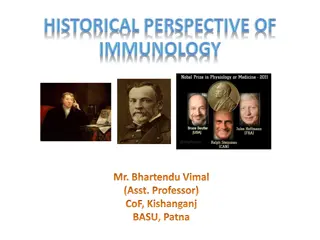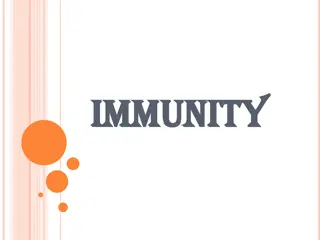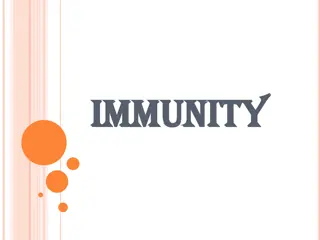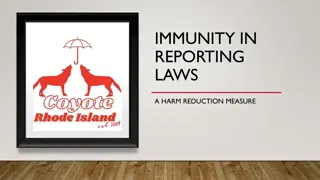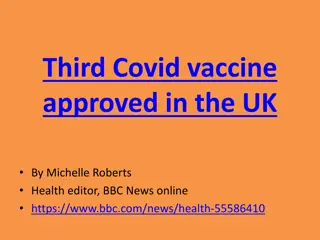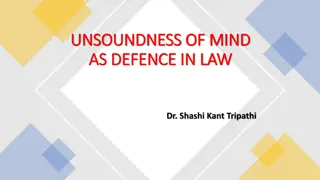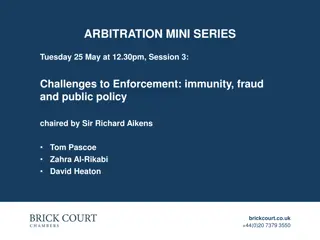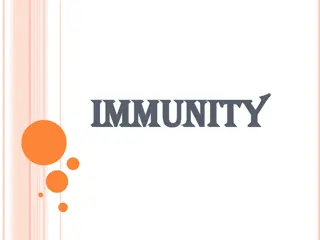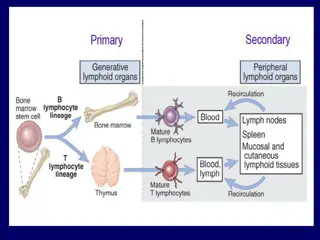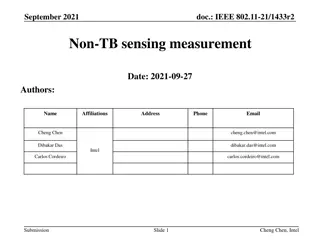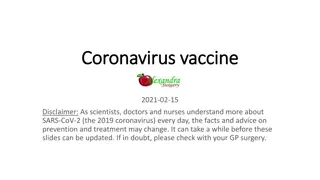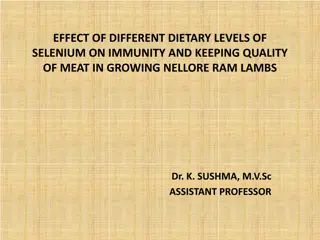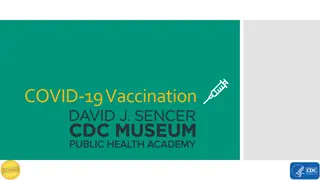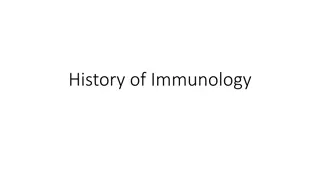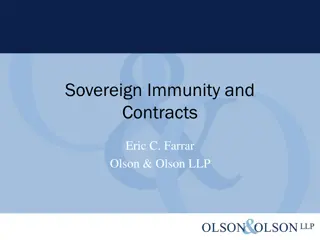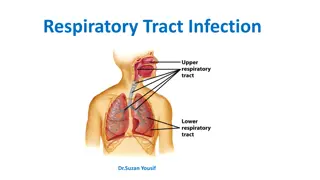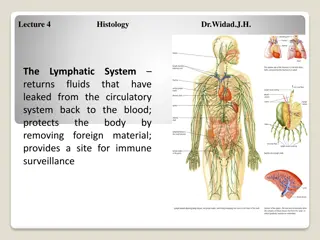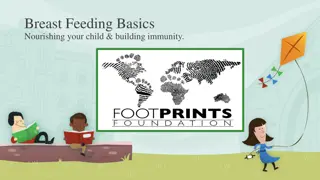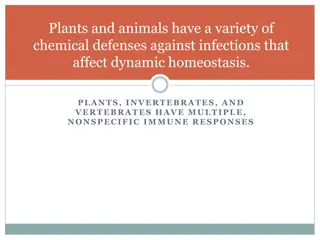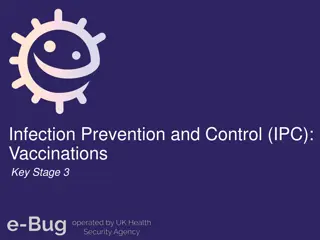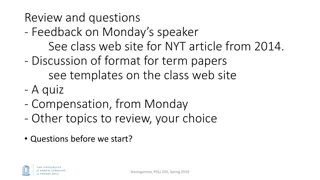Understanding Vaccines and Immunization
Explore the world of vaccines and immunization, learning about active and passive immunity, childhood and adult immunization schedules, common vaccines, contraindications, adverse effects, and the importance of immunization in preventing diseases. Discover the process of immunization and how it stim
2 views • 27 slides
Insights on COVID-19 Immunity and Vaccines: NSI 2021 Lecture Highlights
Delve into the cutting-edge discussions from the Nigerian Society for Immunology's 2021 World Immunology Day event, featuring lectures on the state of NSI, acquisition of immunity to COVID-19, and current vaccine issues. Learn about the structural proteins of the SARS-CoV-2 virus, the importance of
4 views • 46 slides
Understanding Active vs. Passive Immunity for Better Health
Immunity is the body's defense mechanism against diseases. Active immunity occurs through exposure to antigens, either naturally during infection or artificially through vaccines. It leads to the production of memory cells for long-lasting protection. On the other hand, passive immunity involves rec
0 views • 17 slides
Legal Immunity and Liability in Kentucky State
Analysis of legal principles regarding immunity and liability in the Commonwealth of Kentucky, including factors such as public immunity, official immunity, and governmental employee liability. The content discusses scenarios where immunity may apply and exceptions where personal liability can be im
0 views • 7 slides
Overview of Immunology: From Historical Perspectives to Modern Techniques
Immunology is the study of the immune system, its functions, and responses to various stimuli. The field traces back to ancient times, with historical figures like Thucydides and Edward Jenner contributing to its development. From innate immunity to adaptive responses, the immune system plays a cruc
0 views • 29 slides
Understanding Acquired Immunity and Its Types
Acquired immunity, also known as adaptive immunity, is the resistance developed by an individual to foreign molecules. It involves antigenic specificity, diversity, immunologic memory, and self/non-self recognition. The two main types of acquired immunity are active immunity, developed from antigeni
3 views • 17 slides
Understanding Immunity: Types and Importance in Health
Immunity is the body's defense system against pathogens, consisting of innate and acquired types. Species immunity offers resistance at a species level, while innate immunity provides the initial defense mechanism. Acquired immunity can be active or passive, providing specific protection to individu
0 views • 17 slides
Understanding the Importance of Immunity in Reporting Laws
Immunity in reporting laws is a critical harm reduction measure that allows sex workers, trafficking survivors, and certain crime witnesses to report incidents to police without facing arrest or charges. By providing immunity, advocates aim to mitigate the harms of anti-prostitution laws, facilitate
0 views • 6 slides
Understanding Non-Aqueous Solvents: Types and Classification
Inorganic non-aqueous solvents play a crucial role in chemical research and industry. This article by Dr. Princy K.G. delves into the classification of solvents based on protonicity, polarity, and aqueous vs. non-aqueous nature. It explores the types of non-aqueous solvents, such as protonic and non
1 views • 29 slides
Moderna Becomes Third Covid Vaccine Approved in the UK - Important Updates
The UK has approved Moderna as the third Covid vaccine, with logistical challenges due to required storage at -75C. AstraZeneca's vaccine is easier to distribute. Moderna offers nearly 95% protection from severe Covid, but all vaccines require a second dose for optimal immunity. Uncertainty remains
0 views • 7 slides
Understanding Unsoundness of Mind as a Defense in Law
The concept of unsoundness of mind as a defense in law is explored through principles of criminal liability and historical legal perspectives. The defense under Section 84 of the Indian Penal Code provides immunity for acts committed by individuals incapable of understanding the nature of their acti
1 views • 20 slides
Understanding Antibody-Mediated Immunity in Humoral Immunity
This content delves into the mechanisms of antibody-mediated immunity, focusing on B-cells as key players in humoral immunity. It covers topics such as activation of B-cells, clonal selection, generation of plasma and memory cells, primary and secondary immune responses, and the structure and functi
0 views • 20 slides
Understanding Non-Firm Quantities in Electricity Markets
Non-Firm Quantities in electricity markets involve units with non-firm access not being compensated for their non-firm capacity not getting accommodated on the system. The concept of Firm Access Quantity plays a key role in determining compensation levels for units, with differences in implementatio
0 views • 6 slides
Challenges to Enforcement in Arbitration: Immunity, Fraud, and Public Policy
Session 3 of the Arbitration Mini Series on May 25th discusses challenges to enforcement in arbitration, including issues related to immunity, fraud, and public policy. Topics such as extensions of time in fraud challenges, the 1996 Arbitration Act, the Kalmneft factors, and fraud cases in arbitrati
0 views • 20 slides
Understanding Non-Compete Agreements: Enforceability and Requirements
Non-compete agreements are commonly used in the United States to protect businesses from competition by former employees. To be enforceable, these agreements must meet certain requirements, including independent consideration, protection of legitimate business interests, and reasonableness in scope,
0 views • 26 slides
Understanding Immunity: Types and Functions Explained
Immunity is the body's defense mechanism against pathogens, encompassing innate and acquired immunity. It involves resistance to infections and foreign antigens, inherited or acquired. Innate immunity provides the first line of defense, while acquired immunity can be active or passive. Species immun
0 views • 33 slides
Immune Response Regulation and Autoimmunity Overview
The immune system maintains a balance through tolerance mechanisms to prevent autoimmunity. Central and peripheral tolerance play crucial roles in immune unresponsiveness to self-antigens. Failure in immune regulation can lead to autoimmune diseases like diabetes and lupus. Vaccination, discovered b
0 views • 18 slides
Comparison of Trigger-based vs. Non-Trigger-based Sensing Measurement in IEEE 802.11
The document discusses the differences between Trigger-based (TB) and Non-Trigger-based (Non-TB) sensing measurement instances in IEEE 802.11 standards, focusing on who initiates the sensing measurement. TB sensing is initiated by the AP, while Non-TB sensing is initiated by a non-AP STA, enabling o
6 views • 13 slides
Understanding Covid-19 Vaccines and Herd Immunity
Scientists, doctors, and nurses continue to learn more about the coronavirus daily, leading to evolving facts and advice on prevention and treatment. Vaccination helps prevent severe illness from Covid-19, as highlighted by hospitalization and mortality statistics. Long Covid can cause lingering sym
0 views • 20 slides
Advocating for Vaccination in Washington State
Being part of a community means unifying on health issues that matter. Join the Immunity Community campaign to spread knowledge about the benefits of vaccination and address vaccine hesitancy in Washington State. Learn about the importance of vaccines in protecting against diseases and how they cont
0 views • 10 slides
Understanding Measles Vaccination and Herd Immunity: A Comprehensive Overview
Dive into the world of measles vaccination with this detailed presentation covering vaccine composition, symptoms, protection methods, and debunking myths. Learn how vaccinations not only safeguard individuals but also contribute to herd immunity, enhancing community health.
0 views • 19 slides
Building Resilience Through Healthy Habits: Sleep, Nutrition, and Self-Care
Cultivating resilience through impactful habits like prioritizing quality sleep, nourishing food choices, and meaningful breaks for self-care. Understanding the connection between sleep, mental health, immunity, gut health, and overall well-being. Embracing strategies for resilience such as a balanc
0 views • 33 slides
Alaska Supreme Court Denies Hospital Immunity in Physician Privileges Dispute
The Alaska Supreme Court ruled against a hospital in a case involving a physician's failure to report a state board order and evaluation results, leading to termination. The court found that the physician had a constitutional property interest in his medical staff membership, requiring a pre-termina
0 views • 54 slides
Effect of Selenium Levels on Immunity and Meat Quality in Nellore Ram Lambs
Sheep and goats play a vital role in the economy of India, contributing significantly to meat production. The study explores the impact of different dietary selenium levels on immunity and meat quality in Nellore Ram lambs. Selenium plays a crucial role in animal health, particularly in enhancing di
0 views • 26 slides
Importance of Nutrition and Balanced Diet for Health and Immunity
Leading a healthy lifestyle is crucial for improving immunity, which involves maintaining a balanced diet, getting enough sleep, regular exercise, personal and environmental hygiene, and staying optimistic. A balanced diet includes a variety of foods to ensure sufficient nutrients for a strong body
0 views • 23 slides
Understanding COVID-19 Vaccines: Safety, Effectiveness, and Immunity
COVID-19 vaccines play a crucial role in preventing illness by helping the body develop immunity to the SARS-CoV-2 virus. Vaccines like Pfizer-BioNTech and Moderna utilize mRNA technology to trigger the immune system to produce antibodies against the virus. These vaccines are safe, effective, and pr
0 views • 15 slides
Pioneers of Immunology: Jenner, Ehrlich, and Metchnikoff
Edward Jenner initiated the concept of vaccination by discovering that cowpox could confer immunity to smallpox. Paul Ehrlich differentiated blood cells, proposed the side chain hypothesis, and pioneered serum therapy and chemotherapy. Elie Metchnikoff developed the cellular theory of immunity, advo
0 views • 4 slides
Understanding the Intersection of 702 Immunity and the Federal Tort Claims Act (FTCA)
The discussion delves into the concept of 702 Immunity under the Flood Control Act of 1928 and its survival in relation to the Federal Tort Claims Act (FTCA). It explores the origins of 702 Immunity, its implications on government liability in flood-related damages, and how it intersects with the FT
0 views • 4 slides
Understanding Sovereign Immunity and Contracts in Legal Context
Explore the intricacies of sovereign immunity and contracts in legal settings, including waivers, elements of immunity waiver, contractual implications, and the distinction between proprietary and governmental functions of local governmental entities. Delve into the key aspects that govern these leg
0 views • 14 slides
Understanding Respiratory Tract Infections: Causes and Prevention
Respiratory tract infections are commonly caused by viruses, bacteria, rickettsia, and fungi, leading to various health issues. These infections can be transmitted through droplets, droplet nuclei, and dust, emphasizing the importance of maintaining respiratory health through specific and non-specif
0 views • 34 slides
Understanding Antigen-Antibody Precipitation Reaction in Immunity
The humoral basis of immunity involves the specific reaction between antigens and antibodies, resulting in the formation of insoluble precipitates through a process called precipitation. This reaction plays a crucial role in immune responses against infectious diseases, influenced by factors like af
0 views • 16 slides
Recent Supreme Court Cases on Sovereign Immunity
Two recent U.S. Supreme Court cases, Lac du Flambeau Band of Lake Superior Chippewa Indians v. Coughlin and Fin. Oversight & Mgmt. Bd. for Puerto Rico v. Centro de Periodismo Investigativo, Inc., have addressed issues related to sovereign immunity. The cases highlight the complexities and evolving n
0 views • 185 slides
Overview of the Lymphatic System and Immune Response
The lymphatic system plays a crucial role in returning leaked fluids back to the blood, protecting the body from foreign materials, and supporting immune surveillance. It consists of lymphoid cells such as T and B lymphocytes, macrophages, dendritic cells, and reticular cells that work together to d
0 views • 31 slides
Breastfeeding Basics: Nourishing Your Child and Building Immunity
Breastfeeding provides numerous benefits for both the baby and mother, including optimal nutrition, antibodies for immunity, weight management, bonding time, and lower risk of diseases. Learning about proper latching techniques, milk production, positions for breastfeeding, and understanding the ben
0 views • 17 slides
Immune Responses in Plants and Animals: A Comprehensive Overview
Plants and animals have evolved a variety of chemical defenses to combat infections and maintain homeostasis. Innate immunity provides immediate protection through barrier and internal defenses, while acquired immunity offers specific responses involving humoral and cell-mediated mechanisms. Plants
0 views • 26 slides
Importance of Vaccinations in Infection Prevention and Control
Understanding the significance of vaccinations in preventing bacterial and viral infections is crucial. Vaccines help the body develop immunity against harmful pathogens, contributing to overall public health through concepts like herd immunity. Learning about the body's natural defenses and the rol
0 views • 30 slides
Special District Duties and Liabilities Overview: Authority, Immunity, and Actions
This overview covers the authority, immunities, and actions pertinent to board members and staff in special districts, focusing on powers, protections, expressly provided and necessarily implied authority, limitations, and legal protections, including sovereign immunity and legal actions against pub
0 views • 57 slides
Analyses on Legal Immunity, Compensation, and Criminal vs. Civil Sanctions
Exploring concepts of absolute and qualified immunity, challenges in receiving compensation post-exoneration, and the differences between criminal and civil sanctions, shedding light on the complexities of legal justice systems.
0 views • 6 slides
Official Misconduct and Immunity Overview
The content explores cases of official misconduct and immunity, highlighting the wrongful convictions of Henry McCollum and Leon Brown. It delves into the challenges faced by innocent individuals within the justice system, including issues of absolute and partial immunity for witnesses and governmen
0 views • 11 slides
Maharishi's Herbal Immunity Booster – Powered by Nature
Maharishi Amrit Kalash is the ultimate Herbal Immunity Booster, blending 53 herbs into a powerful Ayurvedic formula. This super Rasayana strengthens your immune system, balances your body, and boosts vitality naturally. Trusted since 1986 and backed
0 views • 1 slides

